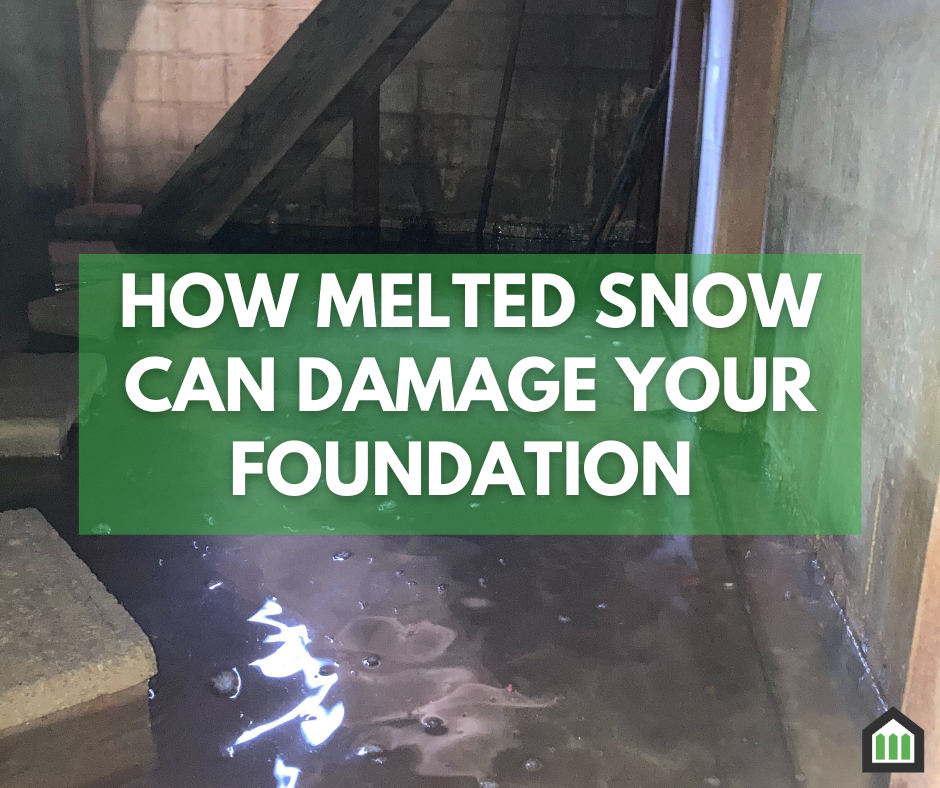Heavy snowfall is not a normal thing here in the southern part of the states. After the significant snowstorm we experienced last month, homeowners were left with several feet of snow. As we enter into March, temperatures begin to warm up, and the snow starts to melt. Melted snow can cause up to an excessive amount of water that needs to drain somewhere. This can leave unwanted water in your basement and/or crawlspace.
Having cracks and small openings within your foundation walls' surface is an open invitation for water to seep into your foundation walls. With temperatures fluctuating, it can create more damage within the foundation than expected. At night the temperatures drop, and in the daytime, temperatures rise, leaving the snow to freeze, melt, and then refreeze. When the water freezes, it expands these small openings into gaps, leaving homeowners with more significant issues than before.
What can additional damage snow bring to your foundation?
Snow may bring more damage than expected for you and your family—several inches of water in the basement concrete causes other damage within your home.
Damaged floors. Any water that resides within the bottoms of your foundation will create water damage. No matter if it is hardwood, laminate, or even concrete slab. Once water is removed from foundation floors, such as laminate or hardwood, the floor will begin to warp and bend.
Damage Walls. With retained water within the crawlspace or basement walls, it can cause the walls to deteriorate, rot and possibly warp once the water dries out.
Damage Appliances. If you currently use your basement as a laundry room or an extra living space. Water can damage your high-end appliances that might be placed in your basements, such as washers and dryers. If machines such as these become wet, the excess water may ruin them forever.
Promotes Mold and Mildew Growth. Having all the extra moisture can cause mold and mildew to develop, which can cause health issues.
Weak Foundation. The constant cycle of water freezing and thawing can cause the foundation to become weak. As water drains through cracks, gaps, and other openings, this can cause erosions to cement or cinder block.
Breaker Failure. If there is a breaker that lives in your basement, water damage can cause the breaker to fail.
Signs & Symptoms of Snow Damage in the Foundation
Standing water from the melted snow will be an obvious sign of water damage within your foundation, but some signs are not that noticeable. In some cases, some signs and symptoms are not recognizable right away. A homeowner could be experiencing cracks, gaps, or openings where water has crept into the basement.
While the snow might be gone outside, the remaining water could be residing in your foundation:
Condensation on the interior of the foundation (walls and ceiling)
If you notice condensation in your foundation's interior, this could signify that water may reside in your foundation.
Water stains
If you have noticed dark spots on the ceilings, floor, or walls, this could mean there is a leak somewhere in the foundation.
Small amounts of water
If you are experiencing small puddles of water on the floor and aware that no one could have placed the water there. This can mean that there is a leak coming from the outside into the foundation.
The sound of dripping water
Water can sneak into the foundation of one's home through the tiniest of holes if you are to hear dripping water in your foundation. This could signify that water could be dripping from inside the cermet/cinder blocks within the foundation.
What To Do Next…
If your foundation has experienced some of these signs or symptoms, the next course of action is to remove the residing water. The sooner, the better! Once the basement has been completely dried, and all the known water has been removed, you may want to consider waterproofing your foundation.
That's where we come in.
As a leading Oklahoma City basement waterproofing company, Vesta Foundation Solutions offers basement flood prevention and waterproofing solutions that will ensure that your basement stays dry.




